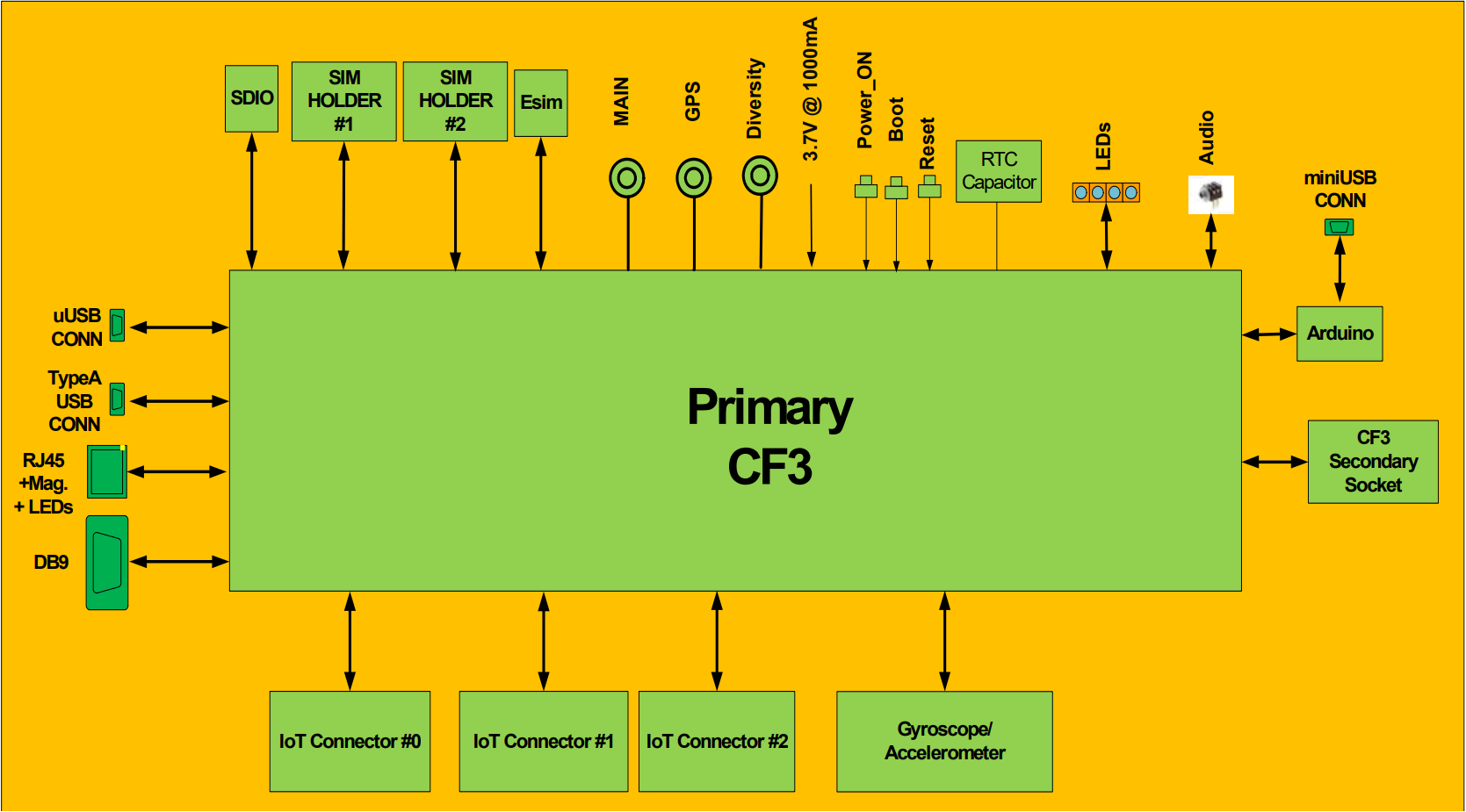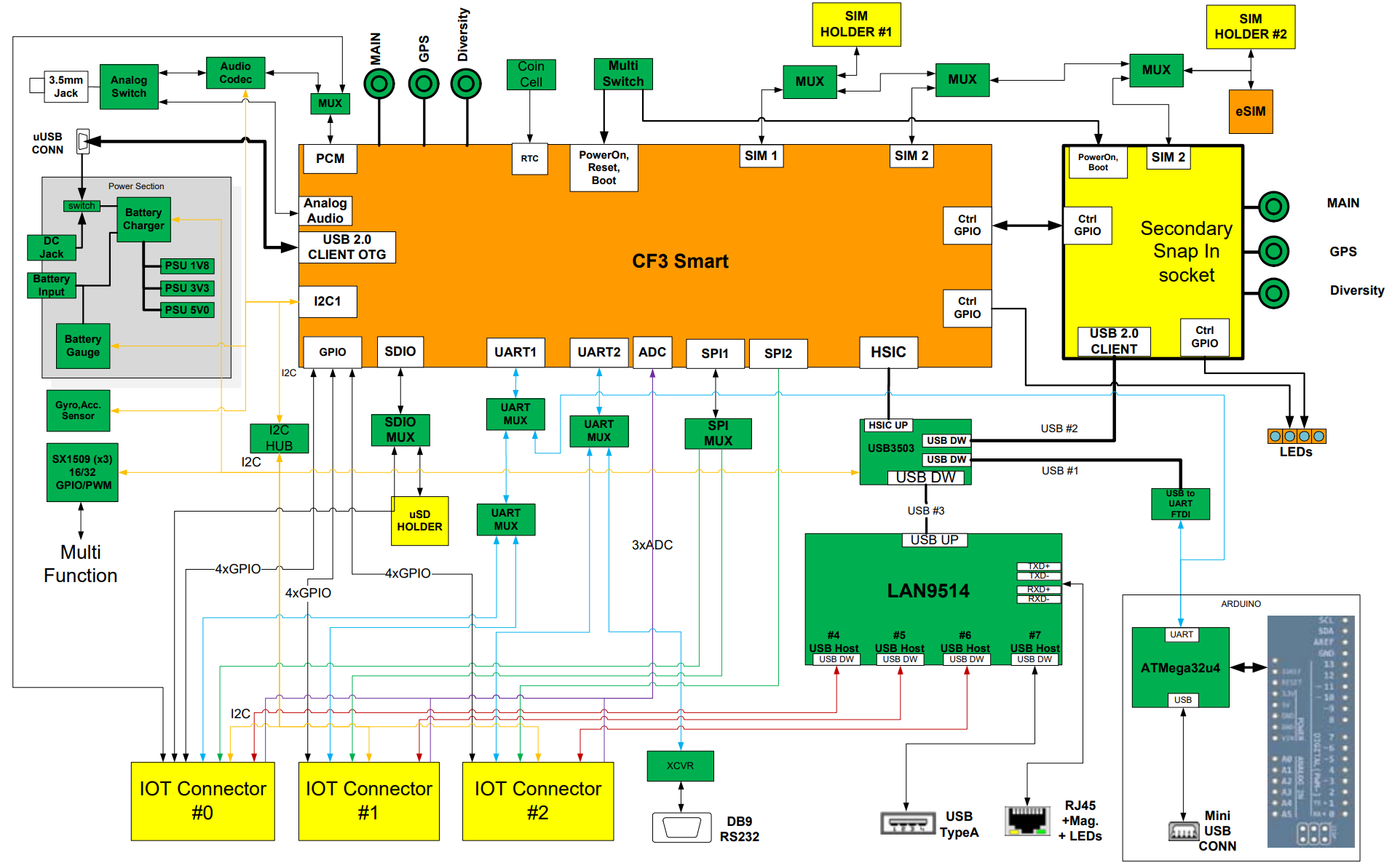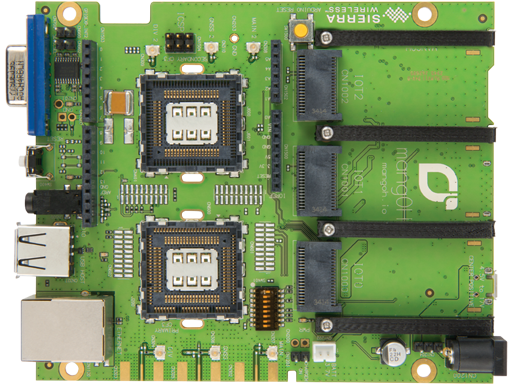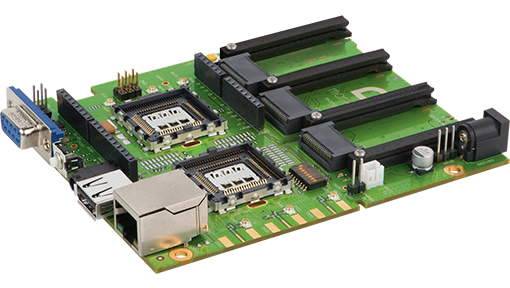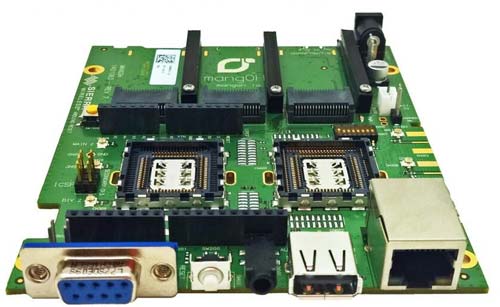1 mangOH Green with WP7607 or WP7607-1
Contents
1.1 Board Overview
The mangOH Green is an open-source hardware development platform for CF3 modules that incorporates several hardware interfaces and standardized IoT Expansion Card slots for expanded functionality.
1.1.1 Block Diagram
1.1.2 Photos
1.2 Build Targets
1.2.1 Machines
Board[1] |
Target YAML[2] |
Machine[3] |
Target Recipe(s)[4] |
Running Media[5] |
Installation Media[6] |
|---|---|---|---|---|---|
mangOH Green with WP7607 or WP7607-1 |
|
|
|
NAND flash |
– |
1.2.2 Images
Read-Only Root Filesystem Image |
Recipe[7] |
Supported by Target(s) |
Description |
|---|---|---|---|
|
|
All |
Standard TanoWrt image. |
Image recipe name. This name can be used as argument
for --target build command option (see Section 1.3 section).
1.3 Build
Please read the common information on how to perform a TanoWrt images build and preparing the build environment in section “Building TanoWrt”.
See also
See section Section 1.2.1 to select the required target YAML file (
<target-yml>).See section Section 1.2.2 to select the required root filesystem image recipe (
<target-recipe>).See section Section 1.5 for detailed information about the produced build artifacts.
1.3.1 Examples
1.3.1.1 Build Default Image for mangOH Green Board with WP7607
$ kas build targets/kas/mangoh-green-wp7607.yml
1.4 Partitioning Layouts
Here is a list of used by system MTD partitions and their descriptions.
MTD |
Name |
Size |
Description |
|---|---|---|---|
mtd11 |
aboot |
1 MiB |
Little Kernel (LK) bootloader |
mtd12 |
boot |
14 MiB |
Linux kernel |
mtd13 |
system |
59 MiB |
Read-only root filesystem (squashfs) |
mtd14 |
lefwkro |
17.25 MiB |
Unused |
mtd15 |
swirw |
15.5 MiB |
Unused |
mtd16 |
userapp |
130 MiB |
Overlay filesystem (ubifs) |
All user data are stored in overlayfs in partition mtd16 (userapp). You can clean up this partition manually after system is boots up using the command:
[root@tanowrt ~]# jffs2reset -r -y
or over web-interface LuCI (see Restore section in System → Backup).
1.5 Produced Build Artifacts
All produced build artifacts are stored in the ~/tanowrt/build/tanowrt-glibc/deploy/images/<MACHINE> directory.
Refer to table Produced Build Artifacts for a description of some common build artifacts.
Artifact |
Target(s) |
Description |
|---|---|---|
Bootloader |
||
|
All |
Bootloader (Little Kernel) binary with fastboot support. |
|
All |
Image with bootloader and linux kernel. |
Linux Kernel and DTB |
||
|
All |
Linux kernel compressed binary image. |
|
All |
Folder with compiled Device Tree Blobs (DTB). |
|
All |
Image with compiled Device Tree Blobs (DTB). |
Images |
||
|
All |
Read-only root filesystem image (squashfs). |
|
All |
Read-only root filesystem image (UBI). |
|
All |
SPK image contains bootloader, linux kernel, DTB and read-only filesystem images. This image can be used for firmware upgrade with swiflash utility (see Writing Images). |
Note
<MACHINE> in the artifacts path and artifact file names are replaced by
the actual value of the MACHINE BitBake variable for the chosen
target. <rootfs-image> is replaced
by the actual read-only root filesystem image name.
For example, below is the lists of artifacts produced by the mangoh-green-wp7607-nand.yml
and mangoh-green-wp7607-sd.yml target builds. There are two types of listings here —
a complete listing, and a reduced listing without the symbolic links display.
[~/tanowrt/build/tanowrt-glibc/deploy/images/mangoh-green-wp7607]$ ls -gGh | grep -v -e "^l"
total 315M
-rwxr-xr-x 1 530K Jul 29 10:56 appsboot.mbn
-rw-r--r-- 1 32 Jul 29 11:00 boot_hash.2k
-rw-r--r-- 1 32 Jul 29 11:00 boot_hash.4k
-rw-r--r-- 1 40 Jul 29 11:00 boot_mbnhdr
-rw-r--r-- 1 6.0M Jul 29 11:00 boot-yocto-mdm9x28-20220729080026.2k.img
-rw-r--r-- 1 6.1M Jul 29 11:00 boot-yocto-mdm9x28-20220729080026.4k.img
-rw-r--r-- 1 6.0M Jul 29 11:00 boot-yocto-mdm9x28.2k.img.signed
-rwxr-xr-x 1 6.0M Jul 29 11:00 boot-yocto-mdm9x28.2k.img.unsigned
-rw-r--r-- 1 6.1M Jul 29 11:00 boot-yocto-mdm9x28.4k.img.signed
-rwxr-xr-x 1 6.0M Jul 29 11:00 boot-yocto-mdm9x28.4k.img.unsigned
drwxr-xr-x 3 4.0K Jul 29 11:00 dtb
-rw-r--r-- 1 67 Jul 29 11:00 kernel.version
-rw-r--r-- 1 44 Jul 29 10:56 lk.version
-rw------- 2 414K Jul 29 11:00 masterDTB.2k
-rw------- 2 420K Jul 29 11:00 masterDTB.4k
-rw-r--r-- 2 37M Jul 29 11:00 modules--3.18.140+git0+4e1fa14c28-tn-3.2.7.20.0.6-mangoh-green-wp7607-20220729063515.tgz
-rw-r--r-- 2 512K Jul 29 11:03 tanowrt-image-full-mangoh-green-wp7607-20220729063515.reset.ubifs.4k.ubi
-rw-r--r-- 2 45K Jul 29 11:02 tanowrt-image-full-mangoh-green-wp7607-20220729063515.rootfs.manifest
-rw-r--r-- 2 21M Jul 29 11:03 tanowrt-image-full-mangoh-green-wp7607-20220729063515.rootfs.squashfs
-rw-r--r-- 2 176K Jul 29 11:03 tanowrt-image-full-mangoh-green-wp7607-20220729063515.rootfs.squashfs.hash
-rw-r--r-- 2 608 Jul 29 11:03 tanowrt-image-full-mangoh-green-wp7607-20220729063515.rootfs.squashfs.hash.txt
-rw-r--r-- 2 5.5K Jul 29 11:03 tanowrt-image-full-mangoh-green-wp7607-20220729063515.rootfs.squashfs.rhash
-rw-r--r-- 2 65 Jul 29 11:03 tanowrt-image-full-mangoh-green-wp7607-20220729063515.rootfs.squashfs.rhash.unsigned
-rw-r--r-- 2 117 Jul 29 11:03 tanowrt-image-full-mangoh-green-wp7607-20220729063515.rootfs.squashfs.ubinize.cfg
-rw-r--r-- 2 24 Jul 29 11:03 tanowrt-image-full-mangoh-green-wp7607-20220729063515.rootfs.version
-rw-r--r-- 2 23M Jul 29 11:03 tanowrt-image-full-mangoh-green-wp7607-20220729063515.squashfs.4k.ubi
-rw-r--r-- 2 325K Jul 29 11:02 tanowrt-image-full-mangoh-green-wp7607-20220729063515.testdata.json
-rw-r--r-- 1 30M Jul 29 11:03 tanowrt-image-full-mangoh-green-wp7607-20220729063515.wp76xx.clean.spk
-rw-r--r-- 1 30M Jul 29 11:03 tanowrt-image-full-mangoh-green-wp7607-20220729063515.wp76xx.spk
-rwxr-xr-x 2 132M Jul 29 11:00 vmlinux
-rw-r--r-- 2 5.6M Jul 29 11:00 zImage--3.18.140+git0+4e1fa14c28-tn-3.2.7.20.0.6-mangoh-green-wp7607-20220729063515.bin
[~/tanowrt/build/tanowrt-glibc/deploy/images/mangoh-green-wp7607]$ ls -gGh
total 315M
-rwxr-xr-x 1 530K Jul 29 10:56 appsboot.mbn
-rw-r--r-- 1 32 Jul 29 11:00 boot_hash.2k
-rw-r--r-- 1 32 Jul 29 11:00 boot_hash.4k
-rw-r--r-- 1 40 Jul 29 11:00 boot_mbnhdr
-rw-r--r-- 1 6.0M Jul 29 11:00 boot-yocto-mdm9x28-20220729080026.2k.img
-rw-r--r-- 1 6.1M Jul 29 11:00 boot-yocto-mdm9x28-20220729080026.4k.img
lrwxrwxrwx 1 40 Jul 29 11:00 boot-yocto-mdm9x28.2k.img -> boot-yocto-mdm9x28-20220729080026.2k.img
-rw-r--r-- 1 6.0M Jul 29 11:00 boot-yocto-mdm9x28.2k.img.signed
-rwxr-xr-x 1 6.0M Jul 29 11:00 boot-yocto-mdm9x28.2k.img.unsigned
lrwxrwxrwx 1 40 Jul 29 11:00 boot-yocto-mdm9x28.4k.img -> boot-yocto-mdm9x28-20220729080026.4k.img
-rw-r--r-- 1 6.1M Jul 29 11:00 boot-yocto-mdm9x28.4k.img.signed
-rwxr-xr-x 1 6.0M Jul 29 11:00 boot-yocto-mdm9x28.4k.img.unsigned
lrwxrwxrwx 1 40 Jul 29 11:00 boot-yocto-mdm9x28.img -> boot-yocto-mdm9x28-20220729080026.4k.img
lrwxrwxrwx 1 25 Jul 29 11:00 boot-yocto-mdm9x28.img.unsigned -> boot-yocto-mdm9x28.4k.img
drwxr-xr-x 3 4.0K Jul 29 11:00 dtb
-rw-r--r-- 1 67 Jul 29 11:00 kernel.version
-rw-r--r-- 1 44 Jul 29 10:56 lk.version
-rw------- 2 414K Jul 29 11:00 masterDTB.2k
-rw------- 2 420K Jul 29 11:00 masterDTB.4k
-rw-r--r-- 2 37M Jul 29 11:00 modules--3.18.140+git0+4e1fa14c28-tn-3.2.7.20.0.6-mangoh-green-wp7607-20220729063515.tgz
lrwxrwxrwx 2 88 Jul 29 11:00 modules-mangoh-green-wp7607.tgz -> modules--3.18.140+git0+4e1fa14c28-tn-3.2.7.20.0.6-mangoh-green-wp7607-20220729063515.tgz
-rw-r--r-- 2 512K Jul 29 11:03 tanowrt-image-full-mangoh-green-wp7607-20220729063515.reset.ubifs.4k.ubi
-rw-r--r-- 2 45K Jul 29 11:02 tanowrt-image-full-mangoh-green-wp7607-20220729063515.rootfs.manifest
-rw-r--r-- 2 21M Jul 29 11:03 tanowrt-image-full-mangoh-green-wp7607-20220729063515.rootfs.squashfs
-rw-r--r-- 2 176K Jul 29 11:03 tanowrt-image-full-mangoh-green-wp7607-20220729063515.rootfs.squashfs.hash
-rw-r--r-- 2 608 Jul 29 11:03 tanowrt-image-full-mangoh-green-wp7607-20220729063515.rootfs.squashfs.hash.txt
-rw-r--r-- 2 5.5K Jul 29 11:03 tanowrt-image-full-mangoh-green-wp7607-20220729063515.rootfs.squashfs.rhash
-rw-r--r-- 2 65 Jul 29 11:03 tanowrt-image-full-mangoh-green-wp7607-20220729063515.rootfs.squashfs.rhash.unsigned
-rw-r--r-- 2 117 Jul 29 11:03 tanowrt-image-full-mangoh-green-wp7607-20220729063515.rootfs.squashfs.ubinize.cfg
-rw-r--r-- 2 24 Jul 29 11:03 tanowrt-image-full-mangoh-green-wp7607-20220729063515.rootfs.version
-rw-r--r-- 2 23M Jul 29 11:03 tanowrt-image-full-mangoh-green-wp7607-20220729063515.squashfs.4k.ubi
-rw-r--r-- 2 325K Jul 29 11:02 tanowrt-image-full-mangoh-green-wp7607-20220729063515.testdata.json
-rw-r--r-- 1 30M Jul 29 11:03 tanowrt-image-full-mangoh-green-wp7607-20220729063515.wp76xx.clean.spk
-rw-r--r-- 1 30M Jul 29 11:03 tanowrt-image-full-mangoh-green-wp7607-20220729063515.wp76xx.spk
lrwxrwxrwx 2 45 Jul 29 11:03 tanowrt-image-full-mangoh-green-wp7607.4k.default -> tanowrt-image-full-mangoh-green-wp7607.4k.ubi
lrwxrwxrwx 2 54 Jul 29 11:03 tanowrt-image-full-mangoh-green-wp7607.4k.ubi -> tanowrt-image-full-mangoh-green-wp7607.squashfs.4k.ubi
lrwxrwxrwx 2 49 Jul 29 11:03 tanowrt-image-full-mangoh-green-wp7607.default -> tanowrt-image-full-mangoh-green-wp7607.4k.default
lrwxrwxrwx 2 69 Jul 29 11:02 tanowrt-image-full-mangoh-green-wp7607.manifest -> tanowrt-image-full-mangoh-green-wp7607-20220729063515.rootfs.manifest
lrwxrwxrwx 2 69 Jul 29 11:03 tanowrt-image-full-mangoh-green-wp7607.squashfs -> tanowrt-image-full-mangoh-green-wp7607-20220729063515.rootfs.squashfs
lrwxrwxrwx 2 69 Jul 29 11:03 tanowrt-image-full-mangoh-green-wp7607.squashfs.4k.ubi -> tanowrt-image-full-mangoh-green-wp7607-20220729063515.squashfs.4k.ubi
lrwxrwxrwx 2 67 Jul 29 11:02 tanowrt-image-full-mangoh-green-wp7607.testdata.json -> tanowrt-image-full-mangoh-green-wp7607-20220729063515.testdata.json
lrwxrwxrwx 2 54 Jul 29 11:03 tanowrt-image-full-mangoh-green-wp7607.ubi -> tanowrt-image-full-mangoh-green-wp7607.squashfs.4k.ubi
lrwxrwxrwx 2 68 Jul 29 11:03 tanowrt-image-full-mangoh-green-wp7607.version -> tanowrt-image-full-mangoh-green-wp7607-20220729063515.rootfs.version
lrwxrwxrwx 1 70 Jul 29 11:03 tanowrt-image-full-mangoh-green-wp7607.wp76xx.clean.spk -> tanowrt-image-full-mangoh-green-wp7607-20220729063515.wp76xx.clean.spk
lrwxrwxrwx 1 64 Jul 29 11:03 tanowrt-image-full-mangoh-green-wp7607.wp76xx.spk -> tanowrt-image-full-mangoh-green-wp7607-20220729063515.wp76xx.spk
-rwxr-xr-x 2 132M Jul 29 11:00 vmlinux
lrwxrwxrwx 2 87 Jul 29 11:00 zImage -> zImage--3.18.140+git0+4e1fa14c28-tn-3.2.7.20.0.6-mangoh-green-wp7607-20220729063515.bin
-rw-r--r-- 2 5.6M Jul 29 11:00 zImage--3.18.140+git0+4e1fa14c28-tn-3.2.7.20.0.6-mangoh-green-wp7607-20220729063515.bin
lrwxrwxrwx 2 87 Jul 29 11:00 zImage-mangoh-green-wp7607.bin -> zImage--3.18.140+git0+4e1fa14c28-tn-3.2.7.20.0.6-mangoh-green-wp7607-20220729063515.bin
1.6 Writing Images
Note that when flashing the <rootfs-image>-<MACHINE>.wp76xx.spk images
(see Produced Build Artifacts section), user data in overlayfs
are not cleared. This allows flashing of a new system while keeping the user
configuration. However, it can also cause issues with the new firmware as it
may not update some important files. See “Used Flash Partitions” section for
extra information about clearing overlayfs data.
To write the built image to the device, follow these steps:
Power off the mangOH Green board.
Turn SW401-7 (TP1_BOOT) DIP switch to ON state.
Connect mangOH Green board with your PC via micro USB cable (connector CN311).
Power on mangOH Green board.
Run the swiflash utility on your PC as follows:
$ swiflash -m wp76xx -i <path-to-image> -p <port>
Where:
- -i <path-to-image>
Path to image file in the CWE (SPK) format.
- -p <port>
USB port that will be used to firmware downloading. You can use any path from
/dev/serial/by-pathor/dev/serial/by-id.
Example:
$ swiflash -m wp76xx \ -p /dev/serial/by-id/usb-Sierra_Wireless__Incorporated_Sierra_Wireless_WP7607_VN91720016071042 \ -i ~/tanowrt/build/tanowrt-glibc/deploy/images/mangoh-green-wp7607/tanowrt-image-full-mangoh-green-wp7607.wp76xx.spk
Wait until the flashing is complete.
Power off mangOH Green board.
Turn SW401-7 (TP1_BOOT) DIP switch back to OFF state.
Power on mangOH Green board.
Flashed system will be booting.
1.7 Booting and Running
Power on board.
TanoWrt will be booting from internal NAND.
Log in to system using default credentials.
Note
We recommend to upgrade your WP76xx modem firmware to release 16 from here.
1.8 Serial Console
At startup, the bootloader and Linux kernel log messages are outputed to the serial port UART2 (RS232 DB9 connector CN700 on board).
The default serial console settings for mangOH Green with WP7607 for bootloader and kernel are described in the table below.
Parameter |
Value |
|---|---|
Baudrate |
115200 |
Data bits |
8 |
Stop bits |
1 |
Parity |
none |
Flow control |
none |
1.9 Default Network Configuration
By default configured and enabled only eth0 interface with static IPv4 address 192.168.10.1
with enabled DHCP server on it.
1.10 Web User Interface
The WebUI can be accessed via any Ethernet port bridged to LAN network (1 or 2) or via USB RNDIS connection through HTTP(s) protocol. You must see something like this in browser:
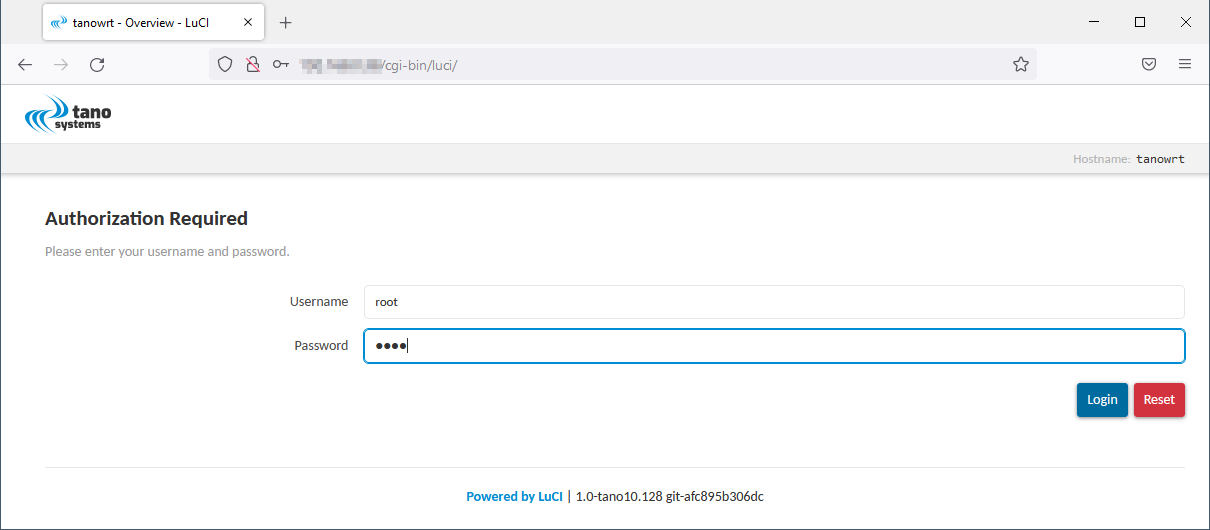
Fig. 1.49 LuCI WebUI Login Page
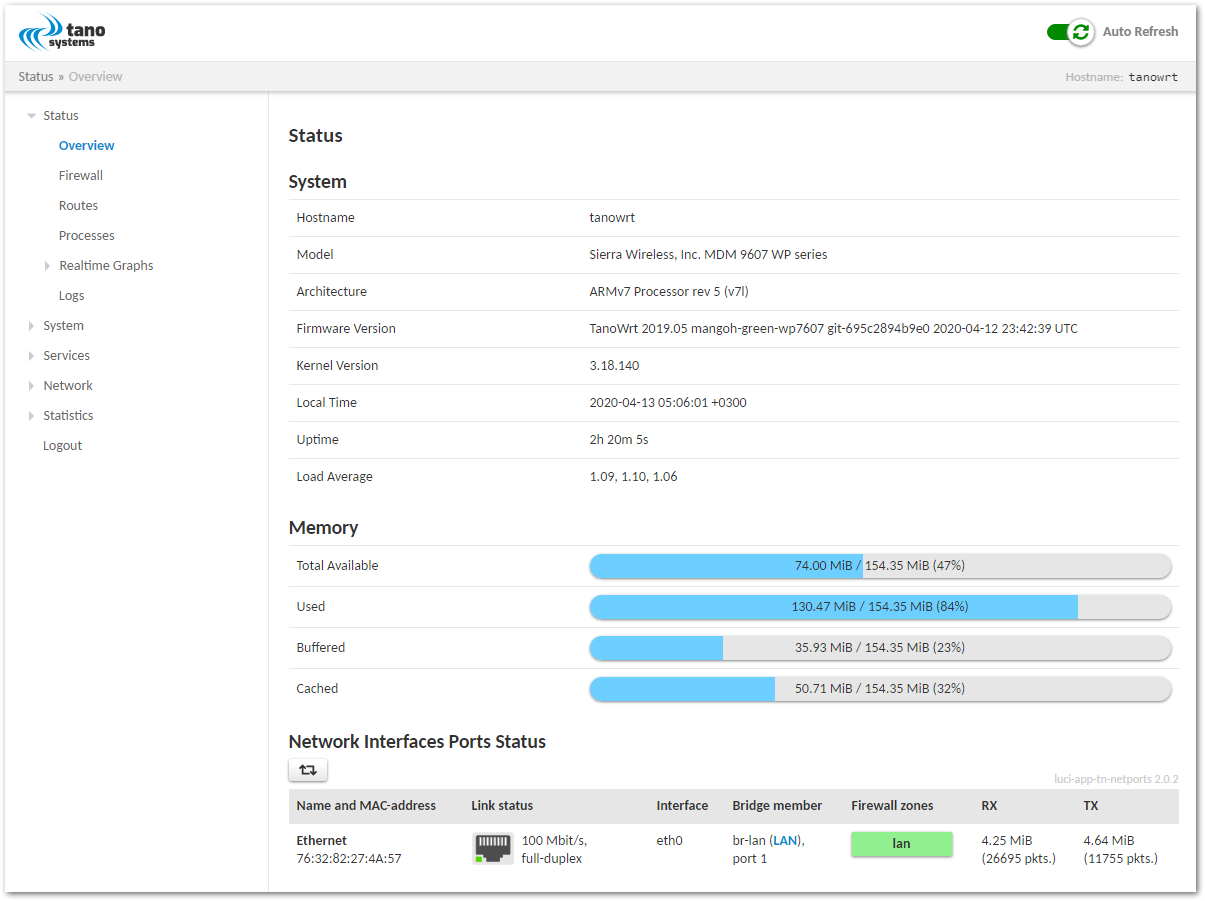
Fig. 1.50 LuCI WebUI Overview Page
1.11 Firmware Upgrade
Attention
Default for TanoWrt firmware upgrade method is not supported for mangOH Green with WP7607 target.
mangOH Green with WP7607 has its own upgrade system.
1.12 Limitations
This layer has very little support for the modem hardware. Using this layer you can only set up a PPP connection using the internal modem AT command port. This is all the capabilities of this layer for using modem hardware.
For support more sophisticated features of the modem hardware, an additional meta-tanowrt-hsl-swi-extras layer is required. Extra meta-tanowrt-hsl-swi-extras layer is a TanoWrt hardware support layer (HSL) for the Sierra Wireless modules contains recipes for proprietary/commercial software. Extra meta-tanowrt-hsl-swi-extras layer provides support for the following extra features:
Partial or full firmware upgrade via WebUI
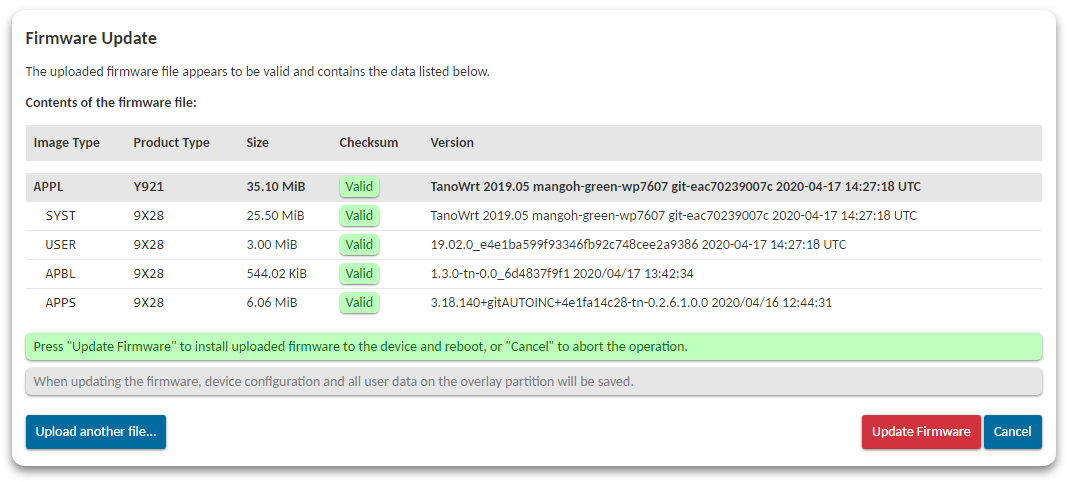
Control and monitor via WebUI or/and ubus
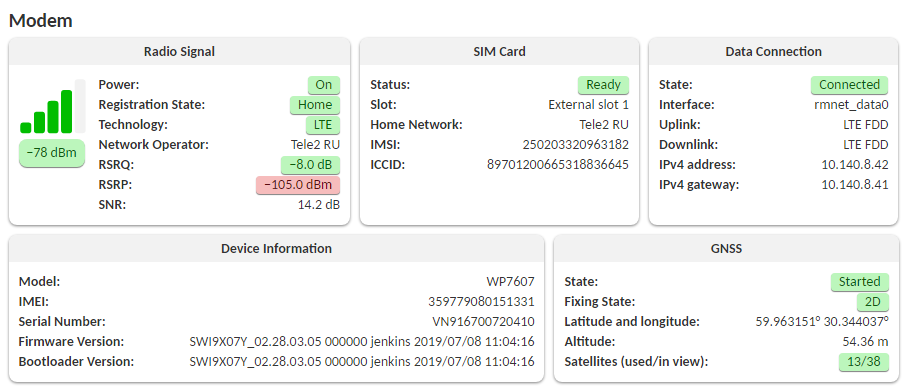
Modem data connection (supported LTE/UMTS/GSM modes)
Support for GNSS subsystem (WebUI and ubus)
Receiving and sending SMS over WebUI or/and ubus with notifications (full UCS2 alphabet support)
and much more…
Sources of meta-tanowrt-hsl-swi-extras layer cannot be published publicly due to Qualcomm Inc. and Sierra Wireless Inc. proprietary licenses restrictions but can be provided commercially. Please contact Tano Systems LLC for details.
1.13 Additional Information
Here are sections with various additional information about the mangOH Green with WP7607 and the operation of TanoWrt on it.
